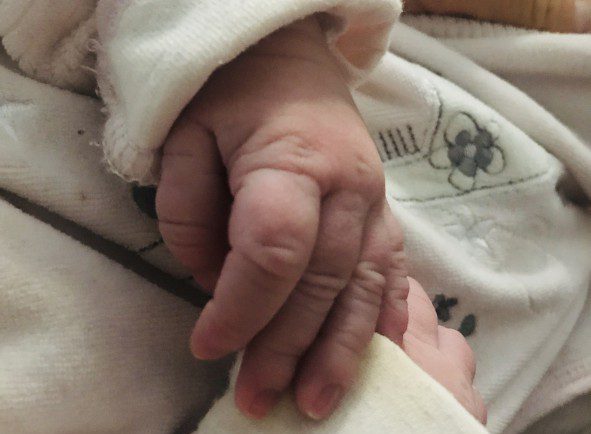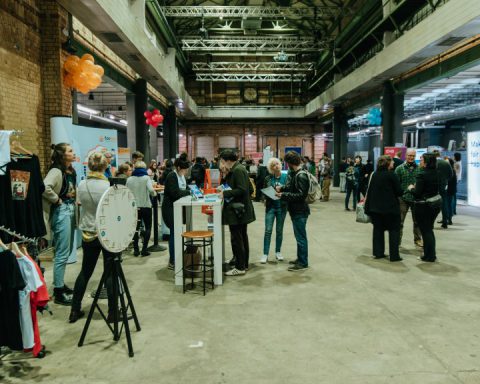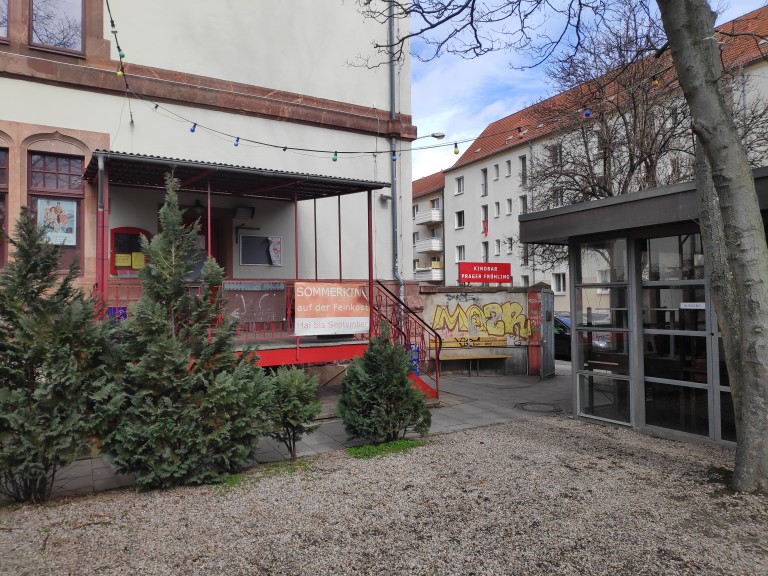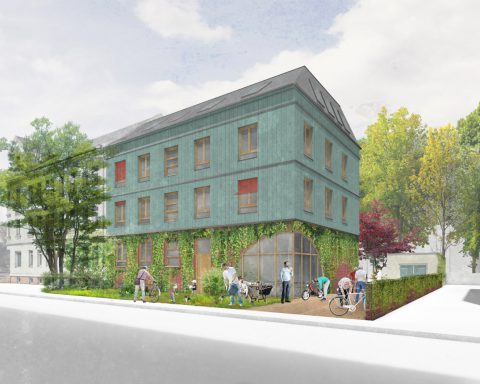The idea was quite simple. To have a third child, machine, body and heart were all ready for the action. Auf die Plätze, fertig, los! Well, all that without taking into account the fact that this third child would be born on German soil, meaning according to local customs. What are the customs and habits of giving birth here? How do they differ from what I knew until then?
My pregnancy, this journey towards my child’s birth in Leipzig, was punctuated by cultural shocks, which were increased by my great sensitivity as a pregnant woman.
It was also marked by some great satisfaction, especially the fact that my boss didn’t blink when I told him I was taking 10 months off work after the birth. In France, maternity leave lasts between two and a half and four and a half months, and it’s often frowned upon to announce you’re going to take parental leave.
During my pregnancy in Leipzig, I looked around for information from women who had given birth here, of which I did not know many. Most of them I did know were actually German. What’s the problem, you might ask? Well, the problem is that childbirth, being a very cultural stage of life (as well as everything that surrounds motherhood, for that matter), was making me ask myself questions that my German friends had never asked themselves. I wanted to have the right to an epidural and stay as long as possible in the maternity ward, for example.

I had worries that were not theirs at all, like how am I going to cope with everything back home, not having any family there, etc.? I searched in women’s groups on Facebook, I talked to my midwife, but always the same thing: Questions juxtaposed to mine, far from my concerns. And I had concerns. I was even so stressed by the fact of giving birth far from my home and my customs, away from my family (prevented from coming because of Corona) that this resulted in my daughter showing up 15 days past the due date.
To start off this mini-series of articles, I will tell you about my experience as a foreigner giving birth in Leipzig.
Then, I will give the floor to several women who have experienced childbirth outside of their home country. All of them come from different backgrounds than mine, in order to counterbalance my personal story. Finally, I’ll propose a small list of tips and will share some good advice that we can give to each other, which I would have liked to have for myself when I was expecting my baby (e.g. where to give birth, how it will happen, who will accompany me during this trip).
But let’s start from the beginning. 76 percent of French women give birth with an epidural (2012 figure, source: Le Monde), and most of them in hospitals, small or large, very rarely at birth centers (Geburtshaus), for the simple reason that in 2020 there were only nine in the whole of France. If you get across the Rhine, only 25 percent of women give birth with an epidural, and a lot of them choose to give birth at one of more than 100 birth centers all spread across the country.
A successful birth here means having given birth without an epidural, going home four hours later, and telling anyone who will listen that everything went wonderfully well.
Personally, I’m not one of those people who absolutely want to have an epidural at a large medical hospital. I had already experienced two births, one with an epidural at the Robert Debré hospital (one of the biggest children’s hospitals in France), the other au naturel in a small hospital at the Ardeche. Yet, I find it tough to live with the injunction of a whole society that considers birth with anesthesia to not be a real birth. That if it’s in a hospital, it’s a shame. That if you don’t breastfeed for a year, it’s not enough.
I really did see those tender pitiful faces when I announced that I wanted to give birth at the Uniklinik: “You didn’t get a place at a birth center, you poor thing.”
I felt obliged to justify my choice. To be somewhere I knew because I had already been there with my own children. A place where many doctors had studied abroad or lived as foreigners themselves. And yes, in the midst of all the unknowns of giving birth in Germany, I thought I would be reassured to feel a little bit of cultural diversity around me. On the other hand, I wanted to have the possibility of uneventfully choosing to have an epidural if the pain proved to be too great.
You should know first of all that, unlike in France, you do not enroll in a maternity hospital where you are to be followed and then give birth there.
No, the follow-up is done in private, with a midwife and a gynecologist, and on D-day one calls a hospital to find out if it can accommodate you, which they can refuse if all delivery rooms are taken. Stressful? Effectively.
A few weeks before the due date, I was already getting ready to leave any minute, given my state of fatigue, the position of the baby, and the words of the midwife who said the baby was ready.
All wrong, my delivery began 15 days past the due date, and without being induced.
I give this detail because in France as well as in most other European countries, the medical profession refuses to wait 15 days after the term. In France, the limit is no more than four or five days past. In my case, I particularly appreciated being able to give the baby her time, especially since the date of conception is not an exact science either.
It ended up giving me more work as the little animal had grown well, weighing more than 4kg!
One fine morning I rang the Uniklinik, and I gave birth there 15 hours later, vaginally, naturally, and without an epidural. The huge difference to my experience in France was that the team that welcomed me was very well trained for this type of childbirth. The midwife and the trainee had techniques to help me make the contractions come stronger because the baby at first did not want to come out.
To my astonishment, the one method that worked very well was the essential oil bath.
This proposal to speed up childbirth made me laugh softly at the beginning, but never being against half an hour of relaxing in a bath, I of course agreed to it. And the natural trigger had indeed taken place! After an hour of bathing, the heavy labor began and I gave birth less than two hours later.
Then, at the time of the biggest and most painful contractions, through touch, kindness, words, and positions which favor childbirth, the team was able to help me get the baby out.

On the other hand, the place of the birth itself was incredibly ideal: a huge room with a birthing bath, a ball, fabric, and a pillow to promote changes of position; the possibility of turning music on; the possibility of dimming the light for more comfort; and finally, an en-suite bathroom. All this would only have been available at the one single natural delivery room usually found in a whole hospital in France. Generally, the French are welcomed into a room with a single bed surrounded by medical devices, with a window if they are lucky.
It seems to me that, in Germany, the idea is not to prioritize comfort but to respect the ways of nature: childbirth without an epidural, with the means being supplied to enable it, waiting for a natural trigger, immediate skin-to-skin contact, breastfeeding.
However, if the woman stays at the maternity ward after giving birth, she will not be very pampered. I was entitled to a double room; single rooms are the exception and not the rule, as is the case in France. And an immediate return home is encouraged.
I myself only stayed one night, since due to the pandemic I couldn’t receive anyone in the room, not even my husband. I found this isolation from my family hard.

Without this restriction, I would have liked to stay at least three nights there, as I did in France. To have bad food, to think of nothing other than my infant. In these 24 hours, no one came to offer me assistance to give my child the first bath, and there was no breastfeeding advice. It might have been so because the staff thought I could manage since it was already my third child. Nonetheless, my return home 24 hours after the birth wasn’t easy.
The fatigue, questionings. Fortunately, as planned in Germany, the midwife who had followed my pregnancy then came to see me every day to check my state of health and that of my baby. Although I had not had a simple relationship with her, I recognize that having a midwife come see me for 15 days after the birth is a very welcome help.
I think what cost me the most was to realize that the pregnant woman as such is not specially protected here, that apart from those medical appointments, society, in general, does not take particular care of her.
A simple example is that there is no priority queue at supermarkets. When I pointed this out to my midwife, she told me that being pregnant is not an illness. So, no, of course, it’s not a disease, but everybody knows that being pregnant we are more fragile, like an elderly person who is given a seat on the tram because she is weaker and more tired than we are.
I have the impression that, here, the pregnant woman is asked to experience this whole stage like a force of nature, without ever pleading or breaking down.
But for me, it would be misplaced feminism to be proud that we are not taken further care of under the pretext that pregnancy is not an illness. I remain immune to the injunction to be, once again, a wonder-woman and to have to go through all this childbirth experience without ever losing heart.
Nonetheless, I adhere to the support of women favoring natural births.






![Wine & Paint event on 9 Nov. 2024 at Felix Restaurant, Leipzig. Photo: Florian Reime (@reime.visuals] / Wine & Paint Leipzig](https://leipglo.com/wp-content/uploads/2024/12/pixelcut-export-e1733056018933-480x384.jpeg)


